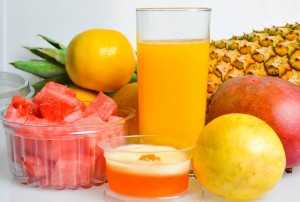To Combat Diabetes, Eat More Fruit and Skip the Fruit Juice
 Recently, science has identified numerous health benefits for blueberries, while also raising new concerns over our regular consumption of fruit juice. According to a new clinical study from Harvard University, eating more fruit can help protect against diabetes, but drinking lots of fruit juice can actually increase a person’s risk of developing this disease.
Recently, science has identified numerous health benefits for blueberries, while also raising new concerns over our regular consumption of fruit juice. According to a new clinical study from Harvard University, eating more fruit can help protect against diabetes, but drinking lots of fruit juice can actually increase a person’s risk of developing this disease.
This surprising diabetes clinical study, which has been published in the British Medical Journal, shows that the consumption of particular fruits (blueberries in particular) can reduce a person’s risk of type 2 diabetes by almost 30 percent. This is based on data obtained from a survey of more than 180,000 participants that were tracked for more than a quarter century.
Eating More Fruit!
The participants in this diabetes clinical trial were questioned about their consumption of various fruits like prunes, grapes, bananas, raisins, apples, oranges, cantaloupe, strawberries, grapefruit, pears, various stone fruits (plums, apricots, and peaches), and blueberries.
Following an analysis of this long-term survey, the blueberries were shown to have the strongest impact on cutting diabetes risk, followed by apples and grapes, especially when at least three servings were consumed per week. A standard serving of blueberries was determined to be a half of a cup.
(The Harvard research team also found that bananas, pears, prunes, and grapefruit also helped reduce the risk of diabetes. However, the other fruits looked at in this survey did not.)
What are Polyphenols?
What accounts for this difference between various types of fruits? According to one of the study co-authors, Qi Sun, this difference is something known as polyphenols. A number of these plant-based chemical compounds – including chlorogenic acid, anthocyanins, and resveratrol, are all potent antioxidants – could help the body metabolize glucose more efficiently. Grapes, apples, and blueberries are all quite rich in polyphenols.
Sun and his colleagues based this new study on data taken from the long-running Nurses’ Health Studies, which have been following the health and lifestyles of participating nurses since 1976 through medical tests and questionnaires. They also included a cohort of 36,173 men from a similar survey of male medical health professionals which was conducted from 1986 to 2008.
The Risks of Drinking Too Much Fruit Juice
Then there was the other intriguing relevation from this diabetes clinical study. It seems that drinking more fruit juices – including those made from oranges, apples, and grapefruits – not only didn’t provide the benefits of eating whole fruits, but it actually appeared to increase a person’s risk of diabetes. The participants that drank at least one serving of fruit juice per day had a 21 percent higher risk of developing diabetes than those who didn’t.
Sun has reported that there could be a few possible explanations for this result. He stated that the juicing process strips out some of the beneficial dietary fiber and phytochemicals. Since fluids are absorbed more rapidly than solids, the consumption of juice produces a quicker and more significant glucose and insulin response in the body than eating whole fruits.
The questionnaires in this clinical study did not specifically ask whether the juice the participants drank on a regular basis was sweetened or pasteurized, even though most of the juices available at grocery stores are.
What Can You Take Away from this Study
Sun claims that it can be difficult to obtain that kind of information during large epidemiological studies. “Participants often are not aware of how much sugar is added to the juices that they typically drink.” says Sun. “One can reasonably assume that juices with added sugar may be more strongly associated with diabetes risk.”
So, what can we take away from the results of this study? Instead of worrying about counting the carbs you’re consuming, you should pay more attention to the types of carbs you’re getting in their diet. For instance, whole grains tend to be a better choice for you than the refined carbohydrates found in white bread. Likewise, whole fruits are a healthier option than processed fruit juices.